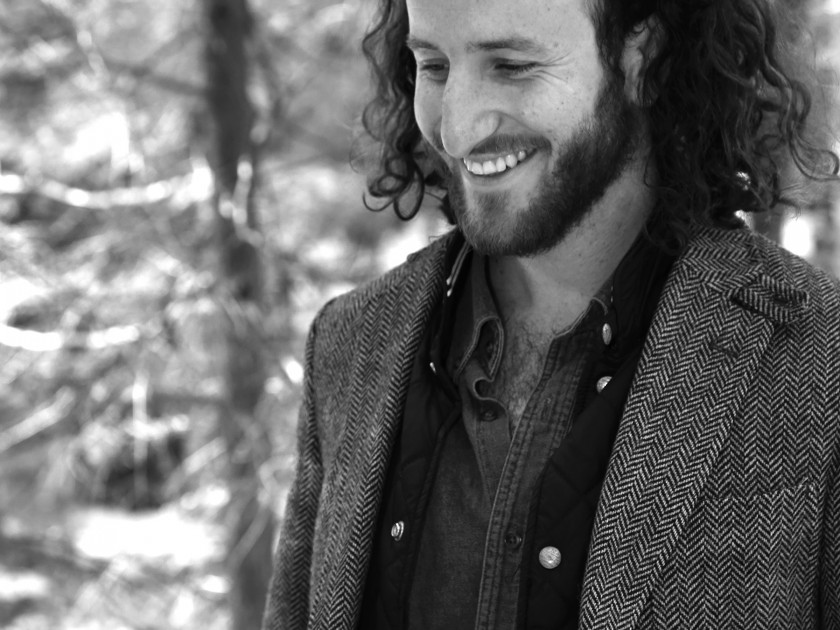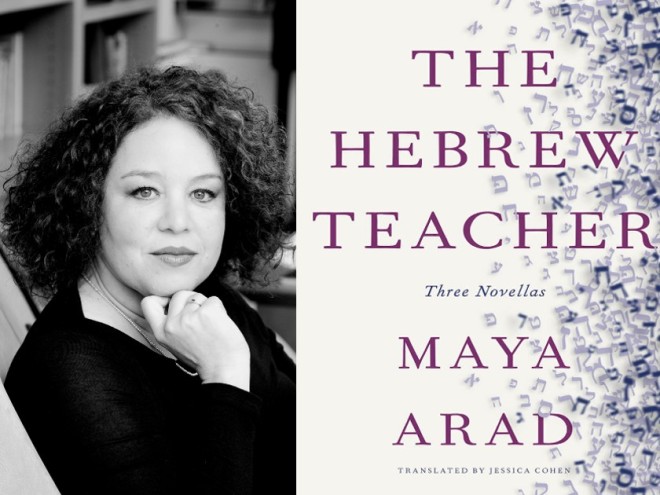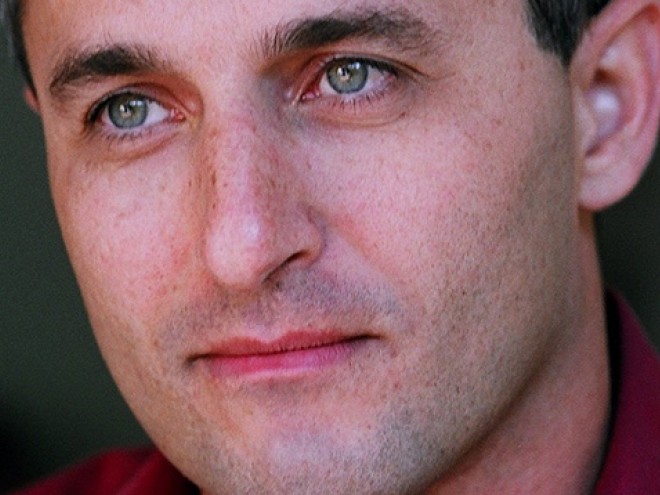
Photo: Joanna Eldredge Morrissey
Moriel Rothman-Zecher’s debut novel, Sadness Is a White Bird, is about a young man preparing to serve in the Israeli army while also trying to reconcile his close relationship to two Palestinian siblings with his deeply ingrained loyalties to family and country.
Ranen Omer-Sherman: You transport us from a military jail cell to a fairly sheltered Jewish American childhood, to the Palestinian experience of the Nakba, and the destruction of the vibrant Jewish community of Salonica in the days leading up to the Holocaust. In the hands of a less assured writer, such ambitious leaps would be insurmountable, yet you somehow pull it off brilliantly. How long did it take all those monumental elements to cohere in your imagination? Did you revise any major plot developments along the way, or was it always clear to you where you were going?
Moriel Rothman-Zecher: Thank you for this wonderful question. It is such a privilege for me to get to discuss this process with you, Ranen. Was it clear to me where I was going? Absolutely not. Growing up, I read a lot of fiction, and certainly harbored some dreams about writing a novel myself some day, but I assumed, as a young reader, that I’d need to figure my whole book out — the characters, the plot, the order, the arc, the meanings — before starting to write. Thank God, that didn’t turn out to be the case. If I’d tried to map out this book before starting, I think I would have been paralyzed, and am not sure I would have been able to start at all. In other words, if I’d consciously set out to write a book that would center around both Israeli and Palestinian protagonists and grapple with the histories of both the Holocaust and the Nakba, I think I might have been overwhelmed by the burden of parsing out the parallels and the lack thereof, the similarities and the imbalances, the impossibility of summarizing the Holocaust or synopsizing the Nakba, and certainly the impossibility of doing both in the same work. Instead, I started writing with very little clarity, and very few plans. I knew that I wanted to write about Jonathan, an American-Israeli IDF soldier who speaks Arabic, and I knew that at some point in the narrative, Jonathan would end up in military jail. That’s all. Everything else — the characters, the plot, the details, the histories — unfolded as I wrote, and shifted and morphed as I revised. I can’t say with any certainty why Salonica and Kufr Qanut (a lightly fictionalized version of Kufr Qassem) became the loci of familial history and familial trauma for Jonathan and for Laith and Nimreen, respectively. I was only certain that I needed to delve more into the family backgrounds of the three main characters, because as this book unfolded, I understood that the novel was going to be about history and its claws and its echoes as much as it would be about the modern/“present” era in which the vast majority of the narrative takes place.
ROS: The main protagonist, Jonathan, is a young man comfortable with his own sexual fluidity. His ease in crossing sexual boundaries seems to strongly relate to his ability to cross other boundaries. Do you see his fluidity as more of an asset, or dangerous irresolution on his part — another factor leading to his crisis in the novel’s climax?
MRZ: I think Jonathan’s relative fluidity — nationally, linguistically and sexually — is an important part of his individuality and his loveliness (I do not see Jonathan a self-portrait, but I do think that I would have been very good friends with him had we met at age 17, and I love him very much). And I also think it is a source of danger and provides him with a powerful opportunity for self-delusion; Jonathan’s narrative, throughout much of the story, is that as long as he remains fluid and open — friends with Israelis and Palestinians, speaking Arabic and Hebrew, in love with Arab women and Jewish men, and Jewish women and Arab men — then he can remain largely sideless, and can ignore the ways in which “sidelessness” does not exist in Israel-Palestine (or, probably, anywhere in the world). On page 89 – 90, Jonathan explains to Laith: “[M]aybe I tricked myself into believing that if I kept the worlds separate, then I’d never have to choose between the two.” (I will add that I think his failure to recognize the significance of his “sidedness” was far more dangerous and delusional nationally than sexually, and in the latter case, I do think I see his disregard for binary sidedness as far less fraught).
ROS: I was impressed by the richly immersive ways that Hebrew and Arabic dialogue transport the reader in your novel. How fluent is your Arabic? As you studied the language at Middlebury College, did that immersion change your sense of Israeliness in any particular way? And did the language hold any surprises for you, then or later?
MRZ: My Arabic is very good, and I feel very fortunate that that is the case. I studied Modern Standard Arabic every semester during my four years at Middlebury, including a stunning Modern Arabic Poetry Senior Seminar taught by Professor Huda Fakhreddine in which I first encountered Darwish’s poems in Arabic (among them “A Soldier Dreams of White Lilies,” from which the title of my novel was drawn, and which plays an important role in the story itself). During two separate summer breaks from college, I lived with a family in Al-Bi’neh, a Palestinian village inside Israel, and was fully immersed for those few months in spoken Palestinian Arabic, and in the parts of Palestinian culture and history and identity that I think can only be encountered in Arabic (similar to the parts of Israeli culture, history and identity that I believe can only fully be grasped in Hebrew). In the years after I moved back to Jerusalem in 2011, I used my spoken Arabic all the time, in visits to the West Bank and East Jerusalem, translating for various groups and visitors, getting to know families and activists, connecting with friends. I am now very comfortable in spoken Palestinian Arabic, and my written/formal Arabic has grown extremely rusty. It was very important to me that this novel, which is written in English, my only writing language, include significant chunks of my two other fluently-spoken languages. Even for a reader who doesn’t speak a word of Arabic or Hebrew, I think the sounds of each language hold significance in and of themselves, and I wanted to make sure to weave a good amount of Arabic and Hebrew transliteration, and not only translation, into the book.
ROS: How did your time in Al-Bi’na, a predominantly Muslim Arab town in northern Israel, impact you? Were your characters directly influenced by anyone you spent time with? And have you received any responses from Palestinian readers of the novel yet?
MRZ: I spent part of the summers of 2008 and 2010 living with Rihan and Maryam Titi and their family in Al-Bi’na (and ostensibly teaching English in the nearby Deir al-Assad, though I’m not sure how much English I actually succeeded in teaching, or how much that was really the point, for any of us involved). These two summers had an enormous impact on my life — as I mentioned before, this was when Arabic came alive for me, jumping from the pages on which I’d studied it in classrooms, into the fabric of the entire world surrounding me for these few months. As my spoken Arabic improved, my understandings of the nuances of Palestinian culture and daily life and humor and history all did as well; and more than that, I encountered Palestinians, for the first time, on their own terms and in their own contexts and in their own language, and through this, forged connections that remain important to me to this day.
In terms of the intersections between the novel’s characters and the actual people I met during those summers: Laith and Nimreen are not direct portraits of specific individuals, but certainly draw parts of their senses of identity and politics and humor from a collage of many younger Palestinian citizens of Israel I met then, and later, in various dialogue programs. I have received a few responses from Palestinian readers which have been very moving, including from Amani Rohana, a dear friend of mine who I met in one of the aforementioned programs in Colorado, who was an early reader of this book in its half-baked manuscript form, and from a few other Palestinian Americans who have enjoyed and appreciated the book as well.
ROS: There is a well-known confessional mode of Israeli writing, often critically derided as yorim ve bochim, literally “shooting and crying,” in which the leftist soldier eloquently laments their participation in the horrors of the Occupation. Some argue this rhetoric clears their conscience and affirms the beauty of their sensitive souls, while avoiding taking direct responsibility for their actions or taking practical steps to significantly challenge the status quo. Do you see your novel responding to that tradition in any way?
MRZ: This is a great question. The yorim ve bochim trope was very much present in my mind as I wended my way through this story, in which the Israeli soldier-narrator ultimately both yoreh ve boche, both shoots and weeps. I am reticent to write too much about this particular subject, as I am conscious of the “spoilers” doing so would necessarily entail, and I think that the novel’s full force depends on a few particular surprises and plot developments, and the unknownness and opacity contained within the zigzagging narrative arc. I will say that I think a lot of the story unfolds from deep within a yorim ve bochim paradigm, and then, toward the end, veers very sharply away from it. In my reading of the novel, no conscience is cleared, nothing is solved or resolved, and the bechi, the weeping, that follows the yeri, the shooting, is neither cathartic nor cleansing. It is simply a physical manifestation of uncontainable grief, vertiginous confusion, and staggering pain.
ROS: Though you are in your twenties and I recently turned sixty, it seems that fiction by writers like Leon Uris profoundly influenced both of our early dreams of moving to Israel and serving in the IDF. (I served in the Paratroopers but that was before two Intifadas, two Gaza wars and two Lebanon wars; facing the painful enormity of all that today I might very well have embraced your principled decision not to serve.) Just thinking about Uris’ Exodus today makes me cringe with embarrassment at how dangerously naïve I was in 1975. Happily we both seem to have moved on to other influences! Your heartfelt homages to two “national” poets, Yehuda Amichai and especially Mahmoud Darwish, constitute some of the novel’s many haunting moments. Are there any other Israeli or Palestinian writers that have had an important impact on your moral imagination, or that you similarly cherish?
MRZ: It is really wonderful to be in conversation with you, Ranen. Just as you think that you might have decided not to serve today, it is clear to me — as much as such an autobiographical and historical counterfactual can be clear — that I would have served (and likely in the Paratroopers!) had I moved to Israel 30 years earlier. On the subject of Exodus, I reread that novel in the early period of writing this one, and while there were certainly many cringe-inducing sections, I was also surprised at how compelling parts of it remained, insofar as I was able to suspend what I have come to know about history and reality and allow myself to re-tumble into the fictional world, with its fantastical interpretations of facts and politics, that Uris created. In terms of other Israeli and Palestinian writers who have impacted my moral imagination and whose writing I cherish, there are two in particular who immediately come to mind: S. Yizhar and Ghassan Kanafani. S. Yizhar’s 1949 novel Khirbet Khizeh about an Israeli soldier ordered to expel the unarmed residents of a Palestinian village during the 1948 War of Independence/Nakba had a profound impact on my political development and my understanding of history; Ghassan Kanafani’s 1969 novella, Returning to Haifa, did as well, though it was harder for me to read than Yizhar’s work, perhaps because the indictment contained in Khirbet Khizeh felt more singularly “historical,” while Kanafani’s novella asks the reader — and, I think, especially the Jewish Israeli reader — to grapple with the ways in which history never ends, and the extent to which the past remains interwoven with the present. (I read both of these works in a brilliant seminar on Zionism with Professor Robert Schine at Middlebury College, along with nonfiction writings by Martin Buber and Edward Said, which also had profound impacts on my thinking, my writing, and my beliefs). Two other works of Israel-Palestine-based fiction that impacted me profoundly and that I will mention briefly were David Grossman’s To The End of the Land and Sayed Kashua’s Let it Be Morning. I also love the poetry of Sami Shalom Shitrit and Taha Muhammad Ali…The list goes on.
ROS: I teach a course on both Israeli and Palestinian writers in translation, and one of the things that always interests students is the way one side imagines or portrays “the other.” Reading the stirring Afterword to Sadness, I was impressed by the deep background you acquired in Darwish’s poetry, and was especially struck by a moment where you quote his impressions of Yehuda Amichai: “We compete over who is more in love with this country, who writes about it more beautifully…When I read him, I read myself.” I had never seen that before, and others I’ve shared it with have also been surprised and very moved by that almost brotherly expression of grace and humility. Can you add anything else about Darwish’s attention to or affinity for Israeli literary culture, or how he stirred your own thinking in other ways?
MRZ: I was also immensely moved by Darwish’s description of Amichai in that interview with Adam Schatz; significantly, that quote is from the same interview in which Darwish talks about his friendship with Yossi, the “soldier who dreamed of white lilies.” Darwish’s discussion of Amichai’s work and his poem about Yossi both struck me as profoundly, startlingly generous. In general, I think it is the generosity of Darwish’s poetry that allowed it to have such a profound impact on my life. If Darwish had written beautifully about Palestinian life and Palestinian suffering, but had included only caricatures of grotesque, brutish Israelis in his writing, as is the case with some nationalist writers (and as is significantly not the case with the aforementioned Kanafani, though he was a strident nationalist and spokesperson for the Popular Front for the Liberation of Palestine), I don’t think I would have believed his poetry in the visceral way in which I did, in which I do. Which isn’t to say I would have disbelieved that Palestinians experience beauty and pain as deeply as Israelis, or doubted that their suffering is genuine and profound. But the image in “Identity Card,” for example, in which Darwish writes “If I become hungry, I will eat the flesh of my usurper” — that sort of fury would have been easier for me to write off as overstated or as wholly illegitimate had it not been written by the same poet who writes of an Israeli soldier: “He dreamed of white lilies, an olive branch, her breasts in evening blossom.” This coupling, I think, forced me to confront certain questions on a deeper level — namely, what sort of humiliation and oppression and torture must be inflicted in order to push someone, even on a literary level, to the point of threatening to eat the flesh of his usurper who he views and recognizes as fully and entirely human.
ROS: You were invited by Michael Chabon and Ayelet Waldman to help edit the acclaimed anthology Kingdom of Olives and Ash: Writers Confront the Occupation, published just last year. Before that, you had already led the participating writers on tours of East Jerusalem and the West Bank. In those intense days spent with foreign writers seeing the conflict through their eyes, did anything shift in your own perception of the conditions of the occupation?
MRZ: I don’t know that seeing the situation through the eyes of the participating writers (and often alongside them as they saw what they saw) shifted my macro-perception of the conditions, as such, but it certainly shifted something in my heart. For example, I knew, intellectually, about the horrific levels of oppression faced by residents of the Shuafat Refugee Camp in East Jerusalem — who are surrounded by a concrete wall that essentially functions as a cage; who receive virtually no services from the Israeli authorities who control their lives, except in the form of regular, violent raids to arrest and sometimes wound and sometimes kill people suspected of crimes ranging from violent attacks against Israelis, to throwing stones at the checkpoint separating the camp from the rest of Jerusalem. I knew all of that on an intellectual level — I’d read the Haaretz articles, and the Ir Amim reports, and had been in the camp a few times in the context of political tours and visits. But during the course of the Kingdom of Olives and Ash project, I accompanied Rachel Kushner into the camp to translate for her and to spend a good part of a weekend with one of the most decent, brave, astonishing people I’ve met in my whole life, Baha Nababta, and his friends and family. Baha was murdered by an unidentified assailant two weeks after Rachel and I met him; the Israeli police to this day have not arrested the perpetrator, and most likely will never do so — his beautiful, vibrant life mattered so little to the state. Rachel’s essay, which was first published in The New York Times Magazine in December 2016, is a beautiful tribute to Baha. I remain deeply shaken and devastated by his murder to this day. I think, in retrospect, the seeds that would ultimately push me to want to leave Jerusalem and leave Israel-Palestine, at least for a long period, were planted the moment I got the phone call from a friend telling me Baha had been killed.
ROS: While you seem to be someone very much at ease in a variety of cultures, you recently resettled in the small town of Yellow Springs, Ohio, which for better or for worse sounds to me just about as remote as one might get from the Middle East. Do you envision ever returning to live permanently in Israel or has life there become untenable for you — and if so, why?
MRZ: I don’t know if I’ll return to live permanently in Israel or not. Life is strange, and winding, and there are so many factors at play. If you’d asked me three years ago where I’d be living in 2018, there’s almost no chance I would have said Yellow Springs, Ohio. My partner, Kayla, and I are expecting our first child, a daughter, this spring; I am both heartbroken to think about her growing up so far away from Jerusalem (I’d long imagined that we’d send all of our kids to the Bilingual School in Jerusalem, that they’d speak Hebrew and Arabic and English fluently from the time they were tiny. Maybe that will still happen. Maybe not) and also immensely relieved to think about our child growing up far away from Jerusalem. This split between Israel-Palestine and America has been a constant, dialectical back-and-forth, physically and spiritually, in my life. Given my own background (Israel-Palestine ages 0 – 5, America ages 6 – 16; Israel-Palestine ages 16 – 17; America ages 18 – 21; Israel-Palestine ages 22 – 28; America once again), and Kayla’s (America ages 0 – 14; Israel-Palestine ages 14 – 29; America once again), I imagine there will be a good deal of back-and-forth in our family’s future as well, but as of this moment, we have no immediate plans to return, except to visit after our baby is born.
ROS: Long before I finished Sadness, I found myself lifting the page after a wrenching revelation or gripping episode, and thinking what a revelation Jewish Israelis and Palestinians might find it. Are there any prospects for a Hebrew or Arabic edition? I know that few Israeli-authored works are ever translated to Arabic, but I couldn’t help wondering.
MRZ: There are no current plans for translation into any other language, but it is certainly my hope that that will change soon. It is very important to me that this book is eventually translated into Hebrew, and I’d like to work closely with the translator — but I wouldn’t want to translate it on my own. My written Hebrew is fine, but I don’t have access to the deepest levels of poetic resonance in the language, nor the linguistic confidence I have in English; and language, to me, is such an important part of this book — more important even, I think, than its plot, or what it is “about.” As for Arabic? I really hope so, too. As you noted, very few Israeli Jewish authors are ever translated into Arabic (in the aforementioned Darwish interview, Darwish noted that most Palestinian intellectuals who had read Amichai read him in English — I wonder, now that I think about it, whether Darwish himself read Amichai in Hebrew or in English?); but it does happen, sometimes, and it would mean a lot to me if it were to happen for this book.
Ranen Omer-Sherman is the JHFE Endowed Chair in Judaic Studies at the University of Louisville and editor of the forthcoming book Amos Oz: The Legacy of a Writer in Israel and Beyond.



